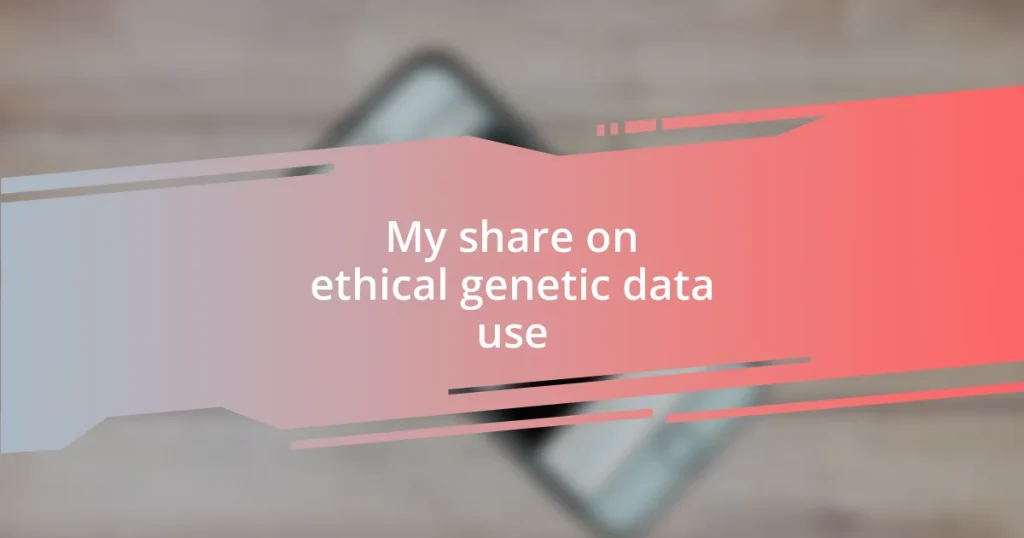Key takeaways:
- Informed consent is essential for ethical genetic data use, fostering trust and empowering participants in research.
- Balancing privacy and research demands requires clear guidelines and ethical oversight to protect individual rights while advancing scientific knowledge.
- Robust legal protections and public education are crucial in addressing genetic discrimination concerns and ensuring the ethical management of genetic information.
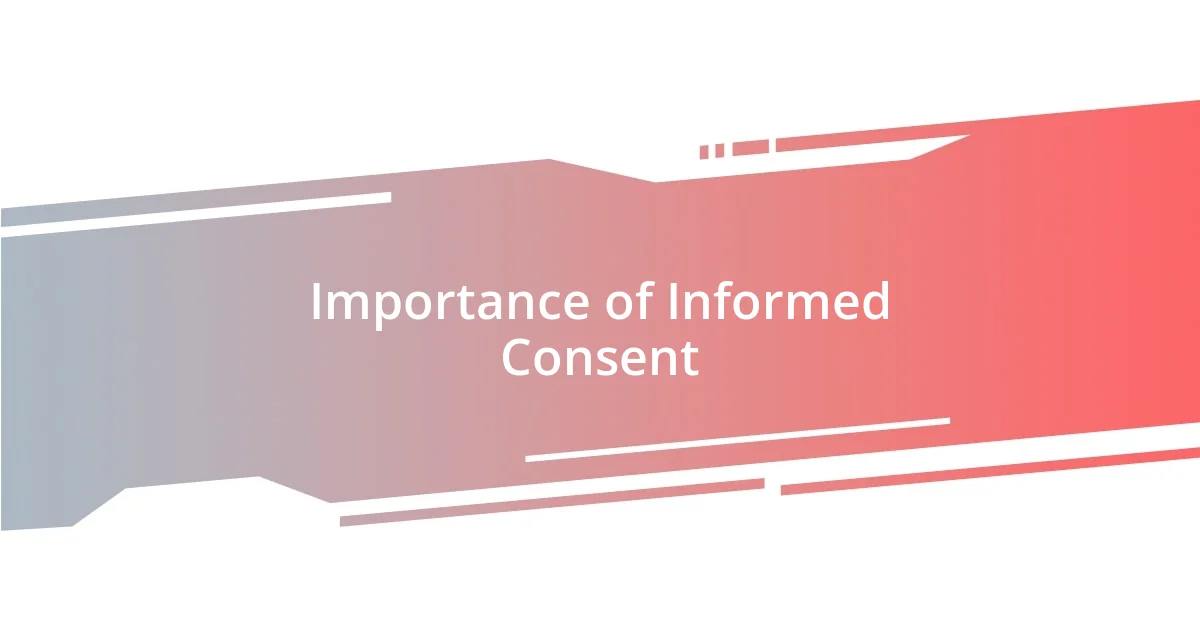
Importance of Informed Consent
Informed consent isn’t just a legal formality; it’s a cornerstone of ethical genetic data use. I vividly remember the first time I signed a consent form for genetic testing, feeling a mix of excitement and anxiety. How many of us truly appreciate the weight of our decisions when it involves personal data, especially something as intimate as our genetic makeup?
Understanding informed consent means recognizing that individuals have the right to know how their genetic information will be used. I often think about how easily we can overlook the implications of sharing such sensitive data. What happens if it falls into the wrong hands or is used in ways we never intended? These are questions that deserve our attention.
Moreover, informed consent fosters trust between participants and researchers. I’ve seen firsthand how a transparent approach encourages people to engage in research. When individuals feel their choices are respected, it creates a collaborative atmosphere that can lead to groundbreaking discoveries. Isn’t it empowering to feel that your voice matters in the complex world of genetic research?
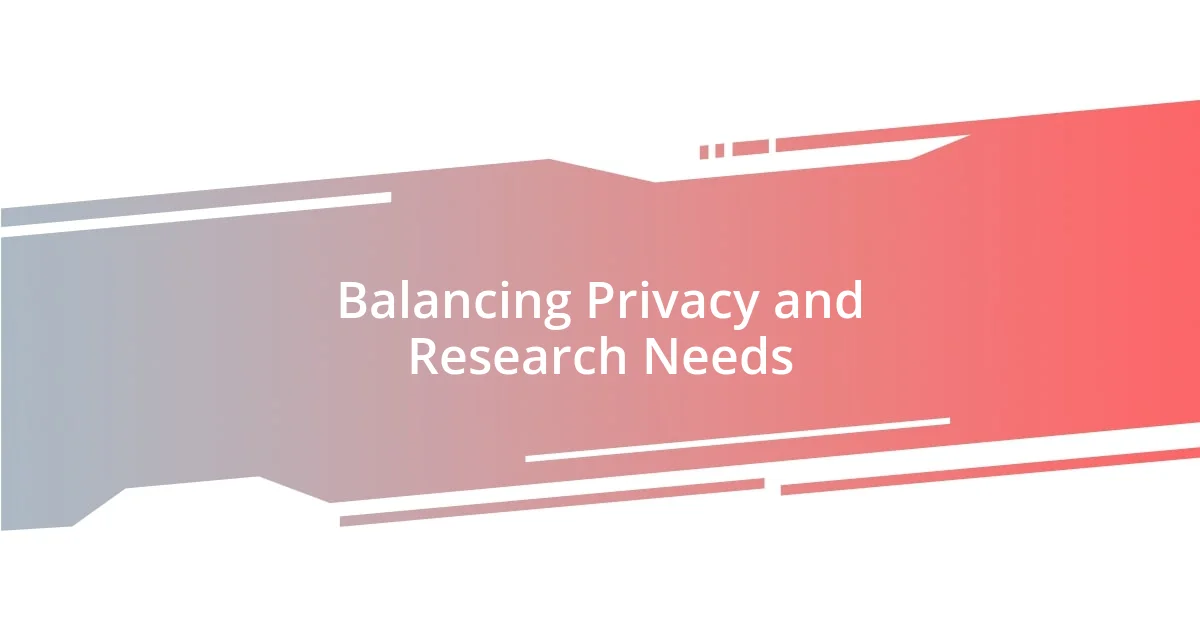
Balancing Privacy and Research Needs
Balancing privacy with the demands of research is a delicate dance. I’ve often encountered scenarios where researchers are eager to access rich datasets for their studies, but this enthusiasm should be tempered with respect for individual privacy. There’s a sense of unease that arises when discussing how seamlessly personal information can be interwoven into scientific projects. I remember a discussion with a colleague who was conducting significant research—he expressed a genuine desire for contributors to feel secure about their data’s confidentiality, which deepened my understanding of this delicate balance.
In practice, ensuring that genetic data is used ethically requires clear guidelines and strict protocols. For instance, I was part of a project where anonymization was paramount. We took great care to remove identifiable information, yet I realized that a part of me still grappled with the thought: Even anonymized data can lead to conclusions that affect real lives. The researchers I spoke with about this shared my concerns, emphasizing that transparency and ethical oversight are vital in the research process.
This conversation inevitably leads me to reflect on the ethical standards that govern research today. I find it imperative for institutions to prioritize both privacy protection and the pursuit of knowledge. After all, ethical scientific progress demands that we protect individual rights while still advancing public health and understanding of genetic conditions. Isn’t it a testament to our humanity that we seek to uphold both principles equally?
| Aspect | Privacy | Research Needs |
|---|---|---|
| Definition | Protection of personal information | Access to data for discoveries |
| Ethical Considerations | Must prioritize individual rights | Must adhere to scientific integrity |
| Key Challenge | Prevent misuse of data | Obtain sufficient data for valid results |
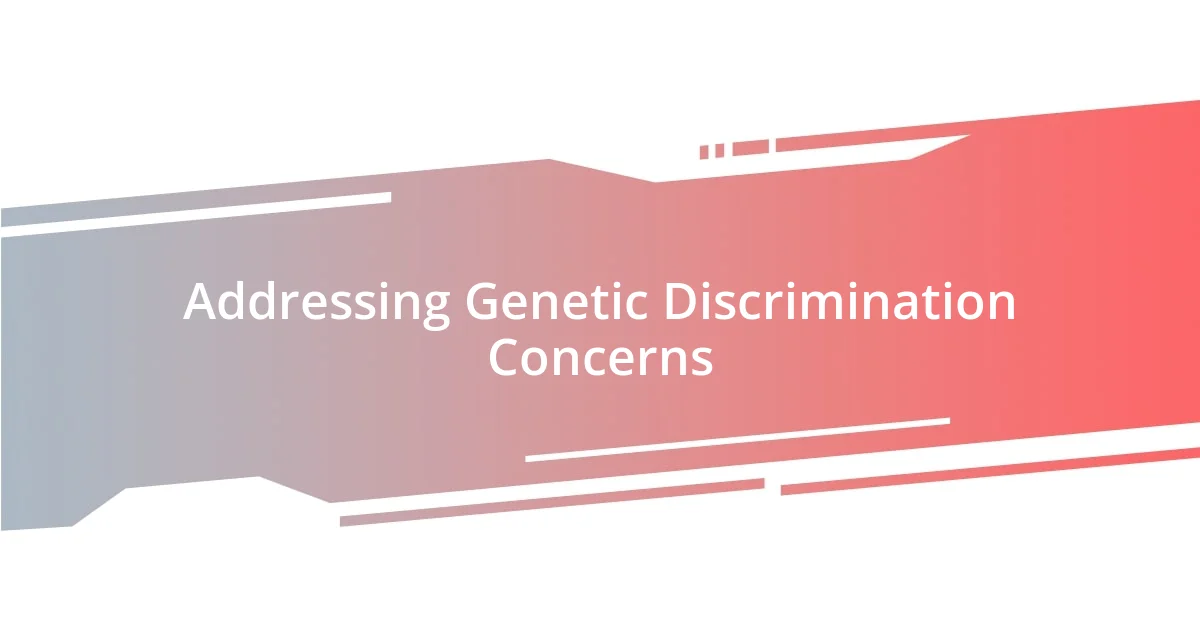
Addressing Genetic Discrimination Concerns
It’s crucial to address the pressing concerns surrounding genetic discrimination. I recall a conversation with a friend who shared her fears about genetic testing impacting her job prospects. It struck me how deeply rooted these anxieties are in our society. When genetic information is misused, individuals risk facing discrimination from employers or insurers, which reinforces the need for strict regulations.
To combat this, we must establish robust legal protections to prevent genetic discrimination, alongside increasing public awareness. Here are essential considerations in this effort:
- Legislation: Implement laws like the Genetic Information Nondiscrimination Act (GINA) to protect individuals from discrimination based on genetic data.
- Transparency: Encourage organizations to be open about how they handle genetic information and the measures in place to protect it.
- Education: Increase public understanding of genetic principles and rights, so individuals are empowered to make informed decisions about sharing their data.
- Support Systems: Create support networks for those potentially affected by discrimination, offering guidance and advocacy.
Understanding these aspects makes it clear that we can pave the way for a more equitable approach to genetic information. My hope is that by fostering greater awareness and creating a culture of ethical responsibility, we can alleviate fears and build a system where everyone feels secure and respected.
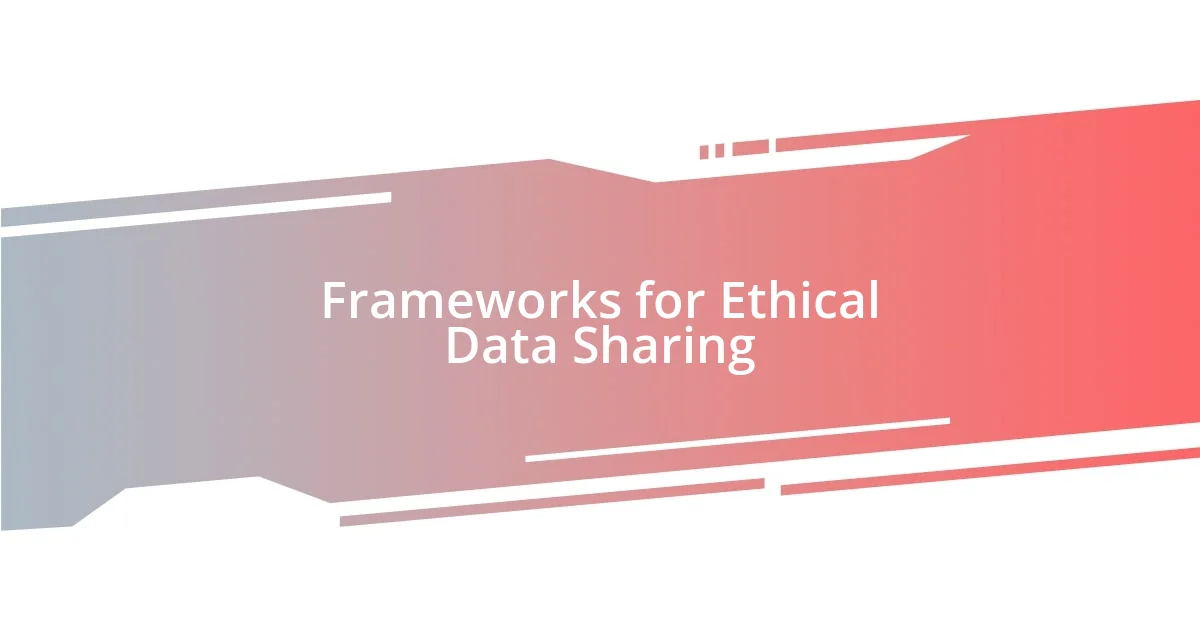
Frameworks for Ethical Data Sharing
Establishing frameworks for ethical data sharing is essential for building trust in genetic research. During a project I was involved in, we developed a clear set of principles that guided our data management practices. This process not only ensured compliance with regulations but also fostered a collaborative environment where participants felt their contributions were valued and respected. Doesn’t it feel reassuring knowing that clear guidelines can protect individuals while advancing science?
Engagement with stakeholders plays a pivotal role in shaping these frameworks. I remember engaging with a diverse group of advocates and scientists during a workshop focused on ethical data use. Each voice brought unique concerns and insights, emphasizing the importance of a multi-faceted approach. It made me realize that ethical frameworks shouldn’t just come from researchers; they need input from the very communities we aim to serve. How can we claim to understand the ethics of data without including the perspectives of those most affected?
Lastly, the integration of technological solutions to enhance transparency is not just a trend—it’s a necessity. In a recent discussion with a tech developer, we explored how blockchain could maintain data integrity while allowing individuals to control access to their information. The idea that technology can empower people to manage their genetic data filled me with hope. Can you imagine a future where individuals dictate how their data is shared and used, thus fully reclaiming ownership of their personal information? That vision is not only possible; it’s increasingly becoming our reality.
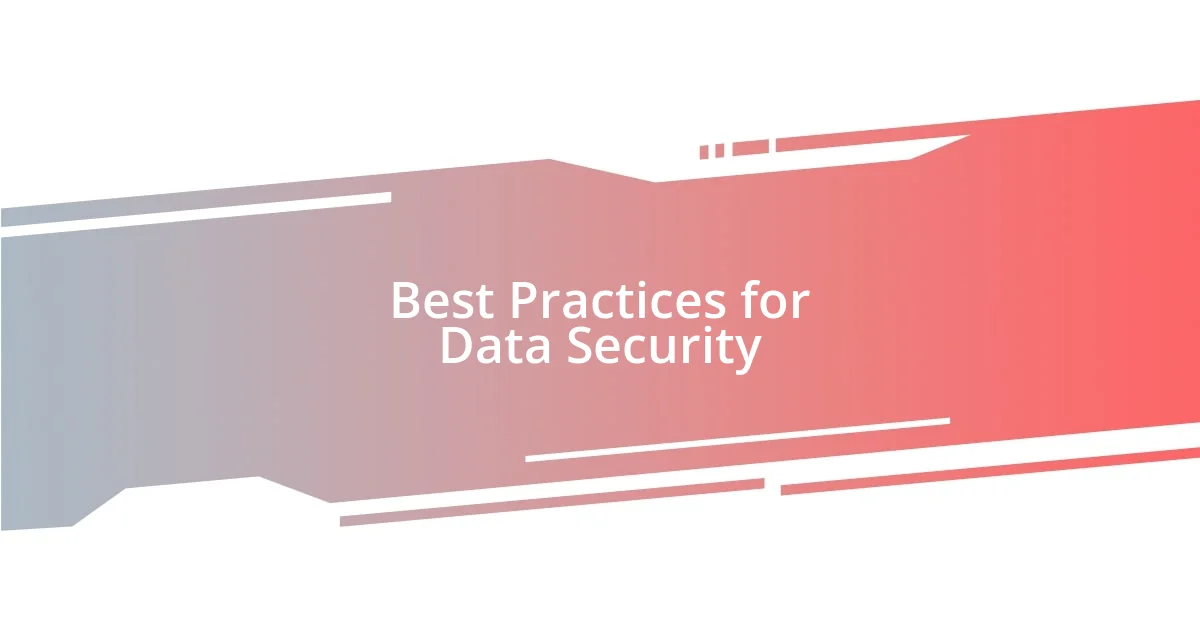
Best Practices for Data Security
Ensuring data security is a top priority when handling sensitive genetic information. I vividly recall a case where a friend’s health data was exposed due to inadequate security measures. It was a wake-up call that demonstrated how easily personal information could fall into the wrong hands. Therefore, implementing end-to-end encryption is vital to safeguard sensitive data from unauthorized access, making it nearly impossible for cybercriminals to exploit it.
Another critical practice is regular audits and assessments of data access protocols. During a project I worked on, we set a timeline for periodic reviews which led us to discover vulnerabilities we hadn’t considered before. Isn’t it fascinating how a simple audit can reveal areas of improvement? By actively monitoring who accesses genetic data and under what circumstances, organizations not only enhance security but also strengthen the trust of participants in how their information is handled.
Lastly, fostering a culture of security awareness within an organization cannot be overlooked. When I attended a seminar on data protection, one poignant statement struck with me: “Every employee has a role in data security.” This reminds us that engaging staff through training and education about best practices can significantly mitigate risks. So, how can we empower individuals to take their roles seriously? Encouraging open discussions about potential threats and practical ways to combat them can cultivate a proactive mindset, ensuring everyone feels responsible for keeping genetic data secure.










